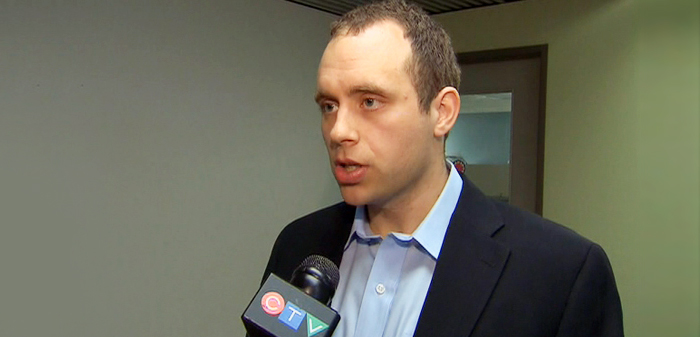 Max Reed, BCL/LLB’11, interviewed by CTV on his efforts to restore transparency to campaign finance laws.
Max Reed, BCL/LLB’11, interviewed by CTV on his efforts to restore transparency to campaign finance laws.
Max Reed, BCL/LLB’11, is spearheading a campaign to restore transparency to campaign finance laws
By Victoria Leenders-Cheng; Photo courtesy of CTV
Elections cost money and the bigger the election, the higher the costs of financing a campaign.
But when Max Reed, BCL/LLB’11, and his friend Adam Chaleff-Freudenthaler started looking into the financial filings from the 2010 Toronto municipal elections, they uncovered serious questions about where the candidates were getting the money they had used to fund their campaigns and how that money was spent.
Reed and Chaleff-Freudenthaler’s allegations that current Toronto Mayor Rob Ford is guilty of many of these improprieties – including using a family holding company to pay for certain campaign expenses and exceeding spending limits by as much as $200,000 – have been the subject of widespread coverage in the Globe and Mail and form the basis for a city-ordered audit of Ford’s campaign finances.
Reed is quick to emphasize, however, that the allegations do not have political motivation and that his goal is in fact much broader than to make Ford the object of further media scrutiny.
“When you have worked in politics, you quickly realize that people who spend more money on campaigns have a tremendous advantage,” he explained. “Our view was that the rules and processes on spending limits are supposed to make elections fair but they are not currently followed and we believe that this fairness – making sure everyone starts in the same place – is integral to an open democracy.”
In fact, he added, “our long term goal is to put together a case for law reform and petition the provincial government to change the rules, to think about what changes could be made to the process as it stands.”
“Max Reed was one of the stars of my Administrative Process class because he understood the political realities right from the beginning,” recalled Rod Macdonald, who teaches constitutional and public law at the Faculty and whose course on administrative processes encourages students to examine how a government functions. “I’m not at all surprised that he is leading the call for more transparency in campaign finance.”
In the six months since Reed and Chaleff-Freudenthaler first read a Globe and Mail article about Rob Ford’s possible campaign finance improprieties and decided to investigate further for themselves, they have established a non-profit, Fair Elections Toronto, and have retained pro bono representation by well-respected lawyers from the Toronto legal community (Rob Ford is appealing the city’s decision to order an audit and the appeal will be heard by the Ontario Court of Justice in April 2012).
They also uncovered questionable campaign finance practices amongst eight other Toronto city council and submitted compliance audit requests for these allegations. In one case, Reed said, a city councilor had taken 32 corporate donations, in clear violation of a rule against corporate donations, and had even self-reported that he took these corporate donations.
“There is currently no enforcement of a very clear and simple rule,” Reed said. “So we are trying to inject some citizen oversight into the process and to use this as an example to drive a policy reform agenda.”
Reed points out that the legal skills he obtained at McGill have been crucial to the process of putting together audit requests. “I took part in the Laskin moot in March 2010 where I learned how to write a factum, to present arguments in a clear and concise way and to let the evidence speak for itself,” he said. “I’m also much more comfortable making an oral presentation than if I had not done the moot or student advocacy. After a dozen practice sessions, the idea of someone asking you tough questions is slightly less intimidating!”
He also has a few words of wisdom for students who may want to use their law degree to embark on less traditional projects: “You have to be entrepreneurial and you have to take risks,” he said. “I decided to put my name on this project, without knowing at the beginning whether that was a good idea or not. But what I learned is that if you take risks, they will sometimes work out in ways you could never have foreseen.”
